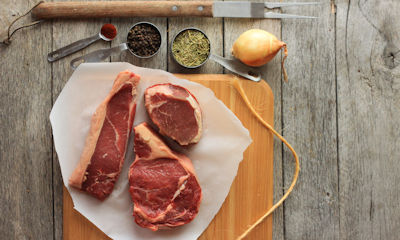September 5, 2016

Organic-certified food demands a premium price in today’s market. Consumers often view the third-party organic certification as verification of a producer’s trustworthiness. Alderspring beef is mainly marketed as certified organic, but there is consumer confusion regarding terms.
“People say bad things about USDA organic,” says Glenn Elzinga frustrated, “and I'm not a big government supporter by any means. There are some big agriculture interests that have been certified organic, and they blew it by not actually following protocol. As a result, the customer’s organic confidence thermometer dropped as they feel they can't trust the certification.”

CONSUMER DEMAND: Alderspring meat is highly-ranked nationally for its flavor and tenderness. Fresh Alderspring Ribeye, New York, and Filet Mignon steaks are perfectly flavored with a few basic seasonings. (Photo: Linnea Elzinga)
Most consumers assume meat labeled as all-natural or organic is produced with the same protocols. The reality is all-natural food production often utilizes chemical inputs, and organic does not. Elzinga says organic certification, “despite it being a government program, is still the strongest thing people have if they want to be sure meat has no chemical risk.”
Elzinga travels to stores interested in partnering with Alderspring to do taste tests and presentations. Recently, he was in a Jackson, Wyoming store and struck up conversation with the meat counter staff. “I asked her, without introducing myself, ‘I don't see any organic on your shelves?’ She said, ‘We have grass-fed and they’re de facto organic. They are hormone and antibiotic free.’
“I said, ‘Do they still feed antibiotics, like subtherapeutically? Or give shots?’ ‘I have no idea what you're talking about.’ I persisted, ‘You really think hormones and antibiotics are the real test for organic?’ She said, ‘Absolutely’
“Meanwhile, in my head, I got $30,000 I spent on noxious weeds last year," he says. Add in his pasture management for chemical-free control of flies; and the fact that he doesn't feed GMO-alfalfa and he knows there's a lot more to organic than leaving out a few items, like hormones and antibiotics."
“If I had known the costs at the beginning — of noxious weeds, the loss of fertility production in the grass — I may not have done it,” Elzinga says of their organic commitment. “We started sucking wind, when those things happened.” But with 4,000 regular online customers plus store locations, and 60% of their customers saying organic is why they choose Alderspring, the organic beef business is working. “At this point going organic was worth it.”
Know where your cattle are
Organic isn’t the only practice utilized at Alderspring. The ranch is in the second year of a rangeland management study funded by the Sustainable Agriculture Research Education program. The Elzingas are monitoring stubble height, plant diversity and weight gain on their yearlings grazing their rangeland by cowboys actively herding the cattle on 5-day, 24/7 shifts. The study includes a rancher with a conventional beef operation grazing rangelands without herding. The study compares weight gains of herded cattle, non-herded cattle, and cattle grazed on irrigated pasture.
“One of the questions we have is, does herding actually make the cattle gain weight better by keeping them on good feed?” Elzinga asks. “Then there is the economic loss to Larkspur versus other years, and to wolf predation. We never graze the riparian areas, only taking the cattle down to drink because we herd the cattle to the dry uplands. The project checks almost every box in the public lands grazing enigma by controlling the cattle, and is recording if it works economically.”
More information on the SARE study, and producer resources, are available at alderspring.com/organic-beef-matters or facebook.com/alderspring
You May Also Like




